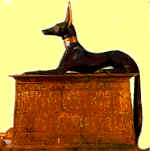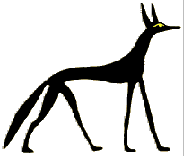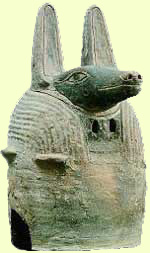Egyptian god of the
dead, represented as a black jackal or dog, or as a man with the head of
a dog or jackal. He was the guide of the dead as they made their way
through the darkness of the underworld. As a patron of magic, it was
believed he could foresee a persons destiny, in this role he was the
announcer of death. God of orphans, travelers, and the lost.
Anubis, also known as Anpu and Anu-Oobist, is the jackal god of embalming. He is the Opener of the Way, or as some might prefer to call him the Guardian of the Veil. To some he was God of Embalming, Mummification, Guardian and Guide to the Spirits of the Deceased, Patron of Orphans and Lost Souls, God of Magic, and the Egyptian Personification of Time.
He
was also considered a great messenger, one who carried messages from the
Underworld to the Gods and Goddesses of the Heavens, as well as from
these deities to mankind itself. He was a diplomat with a dark and
sardonic nature, but showing of compassion. He served a vital role to
both the peoples and the scheme of the Gods.
In
many ways, Anubis is the most enigmatic of the gods of ancient Egypt, a
god who was neither what he seemed nor what he should have been. His
mother was Nephthys, wife and sister of Set, whom everyone assumed to be
Anubis' father. His real father, however, was Osiris, husband and
brother of Isis. Nephthys, weary of being childless through her husband,
took or maybe seduced Osiris to be a lover.


